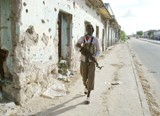A Somali official yesterday appealed for international help to fight piracy, saying the war-torn nation needed an effective coastguard, equipment and training to combat the high-seas menace.
Nur Mohamed Mohamoud, deputy director of Somalia’s national security agency, told an international conference that it was keen to tackle the pirate threat that is disrupting one of the world’s busiest maritime trade routes.
“We know where they hide. We are prepared to fight. We ask the international community to help us to fight piracy,” he told the conference of maritime experts, diplomats and security officials meeting in the Malaysian capital.

PHOTO: REUTERS
“We need an effective coastguard to protect our fishermen from illegal fishing, to prevent dumping of toxic materials in our waters and fight shipping piracy,” he said. “We ask the international community ... to supply us with equipment and training.”
A country of 7 million people, Somalia has had no effective central authority since former Somali president Mohamed Siad Barre was ousted in 1991, setting off a bloody cycle of clashes between rival factions.
Pirate attacks off Somalia and in the Gulf of Aden jumped tenfold in the first three months of this year compared with last year, rising from six to 61, data from the International Maritime Bureau showed.
Mohamoud said that Somalia, where the current transitional government is facing a serious challenge from Islamist insurgents, would not be able to eradicate piracy as long as it remained poor and ungoverned.
“Somalia is a war-torn country. We want Somalia waters to be safe. We do not want pirates in our waters,” he told the meeting.
“An end to piracy can only be brought if the rule of law can be enforced and causes of piracy tackled. Piracy will continue to be a problem as long as the violence continues in Somalia,” he said.
Experts at the two-day conference in the Malaysian capital will tackle divisive issues including who should pay for anti-piracy operations, and whether crews should be armed or mercenaries hired to guard ships.
There is also a debate over what to do with pirates arrested by the navies patrolling the troubled region and whether short-term security measures or longer-term development initiatives are the best way to curb high-seas crime.
Speakers include UN envoy for Somalia Ahmedou Ould-Abdallah, US naval and coastguard officials and Tim Wilkins from owners’ association INTERTANKO.
The delegates will adopt a statement today outlining possible solutions to eliminate the pirate menace.
Somali piracy started two decades ago with more noble goals of deterring illegal fishing and protecting the nation’s resources and sovereignty at a time when the state was collapsing.
Today’s pirates have morphed into a sophisticated criminal ring with international ramifications. Anti-piracy naval operations operating under US, EU and NATO commands now patrol the region.
Some 20 foreign warships cruise Somalia’s coast on any given day in a partly successful effort to protect the trade route, but experts at the meeting will discuss a more comprehensive solution.

A missing fingertip offers a clue to Mako Nishimura’s criminal past as one of Japan’s few female yakuza, but after clawing her way out of the underworld, she now spends her days helping other retired gangsters reintegrate into society. The multibillion-dollar yakuza organized crime network has long ruled over Japan’s drug rings, illicit gambling dens and sex trade. In the past few years, the empire has started to crumble as members have dwindled and laws targeting mafia are tightened. An intensifying police crackdown has shrunk yakuza forces nationwide, with their numbers dipping below 20,000 last year for the first time since records

EXTRADITION FEARS: The legislative changes come five years after a treaty was suspended in response to the territory’s crackdown on democracy advocates Exiled Hong Kong dissidents said they fear UK government plans to restart some extraditions with the territory could put them in greater danger, adding that Hong Kong authorities would use any pretext to pursue them. An amendment to UK extradition laws was passed on Tuesday. It came more than five years after the UK and several other countries suspended extradition treaties with Hong Kong in response to a government crackdown on the democracy movement and its imposition of a National Security Law. The British Home Office said that the suspension of the treaty made all extraditions with Hong Kong impossible “even if

CAUSE UNKNOWN: Weather and runway conditions were suitable for flight operations at the time of the accident, and no distress signal was sent, authorities said A cargo aircraft skidded off the runway into the sea at Hong Kong International Airport early yesterday, killing two ground crew in a patrol car, in one of the worst accidents in the airport’s 27-year history. The incident occurred at about 3:50am, when the plane is suspected to have lost control upon landing, veering off the runway and crashing through a fence, the Airport Authority Hong Kong said. The jet hit a security patrol car on the perimeter road outside the runway zone, which then fell into the water, it said in a statement. The four crew members on the plane, which

Japan’s ruling Liberal Democratic Party (LDP) and its junior partner yesterday signed a coalition deal, paving the way for Sanae Takaichi to become the nation’s first female prime minister. The 11th-hour agreement with the Japan Innovation Party (JIP) came just a day before the lower house was due to vote on Takaichi’s appointment as the fifth prime minister in as many years. If she wins, she will take office the same day. “I’m very much looking forward to working with you on efforts to make Japan’s economy stronger, and to reshape Japan as a country that can be responsible for future generations,”